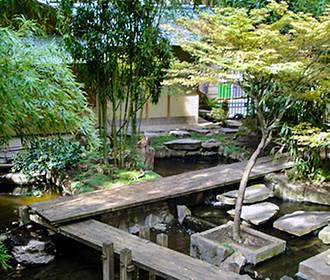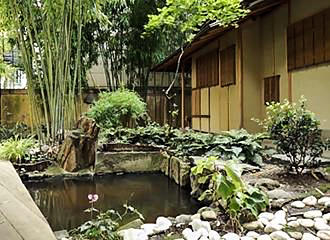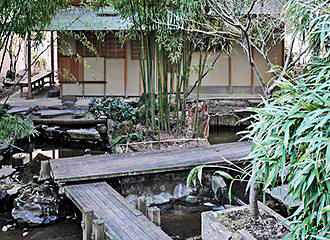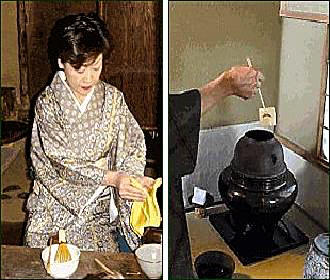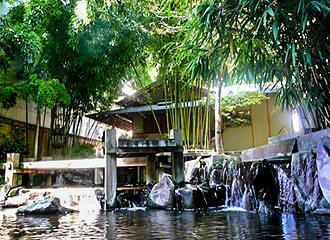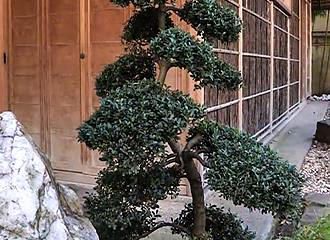Japanese Garden and Tea Pavilion in Paris
Linked to the Musee Guimet and located at the Hotel Heidelbach, which was formerly the home of the Pantheon Bouddhique museum in Paris you will find a lovely small Japanese garden and a Tea Pavilion where the traditional Japanese Tea ceremonies are held.
About the Japanese Garden and Tea Pavilion
The small garden called Jardin Japonais in French, along with the Pavillon de The are located at the Hotel Heidelbach, which is a former mansion house that was turned into the museum in Paris called the Pantheon Bouddhique.
The Buddhist Pantheon was founded as an addition to the Musee Guimet, or with its full title, the Musee des Arts Asiatique Guimet, with a collection that was first accumulated by its founder Emile Guimet.
The Japanese Garden of the Hotel Heidelbach was opened up shortly afterwards, then on the 10th anniversary of the Buddhist Pantheon the Tea Pavilion was inaugurated, although the Pantheon Bouddhique has now been incorporated within the Musee Guimet.
The small Jardin Japonais was designed to be a calming area respecting the traditions of the Japanese with well known varieties of plants such as bamboo, and originally created by Robert Bazelaire, it has a little stream with stepping stones that makes it an even more serene place.
The Pavillon de The was designed by Professor Masao Nakamura and constructed under the master carpenter Yamamoto in a way as to incorporate the four principles that were laid down by the Tea Master Sen No Rikyu.
These four principles are Wa for harmony, Kei for respect, Sei for purity and Jaku for serenity and are a fundamental part of a traditional tea ceremony in a building specifically designed for the purpose, just like those in Japan, which are known as Chashitsu, which you can now get to experience while on holiday in Paris.
This is one of the more unusual tourist attractions in Paris that will provide an even greater understanding of one of the finest arts of living in Japan and after experiencing a traditional tea ceremony, there is a documentary about the tea, plus the Hotel Heidelbach is now home to a museum based on tea.
Visiting the Jardin Japonais Japanese Garden
The garden itself normally opens at the same time from approximately 10am through to 5pm yet there are also exceptions, as the number of people allowed in this garden in Paris at any one time is always limited due to its size of approximately 450 metres squared and unfortunately it is not accessible to the disabled. Plus this is also closed to the public when they are performing the famous tea ceremony.
Visiting Pavillon de The Tea Pavilion
Each of the tea ceremonies lasts approximately one hour and you get to see a shortened version of the tradition performed by a tea master, and then this is followed by a documentary about the art of tea.
You do have to book this in advance by telephone on +33 (0) 1 56 52 53 45 with an approximate cost of €15 per person, and they are normally conducted at set times on a Thursday.
Upon arriving at the Hotel Heidelbach, you will follow a Japanese guide through the garden and over the water via the stepping stones to reach the Pavillon de The and then you will be directed to take your shoes off before entering the Tea Pavilion, so with this in mind, it is an idea to wear socks.
When entering, minding your head as the doorway is actually quite low, you are then instructed to sit down, either kneeling or cross legged on a traditional tatami mat, and these mats are specific in their size and designed purely for a tea ceremony building or room for that purpose.
So, again do bear this in mind, and it is advised that you wear loose comfortable clothing, but obviously it is also not suitable for those with mobility problems.
Then you will watch the tea master prepare the utensils and make the tea from the powdered green tea in this centuries old tradition, before then watching a documentary about the art, which can take anything up to around 25 years of study before a person can become a Japanese tea master.
However, we would like to point out that the Japanese Tea Ceremony is only performed at this museum in Paris during the warmer months and is not available through winter, as it is performed utilising specific utensils based on the season, which is one of the traditions, plus obviously the weather also plays a major role.
Access to Japanese Garden and Tea Pavilion
Arriving at the Pavillon Japonaise and the Hotel Heidelbach, formerly home to the Pantheon Buddhique, is actually very simple considering its location is on the opposite bank of the River Seine to the Eiffel Tower and close to the Jardins du Trocadero, which are the fabulous gardens in Paris by the Palais de Chaillot.
This Japanese Garden and Tea Pavilion located in the 16th Arrondissement of Paris are also just down the road from the Musee Guimet, which was the original museum before these opened as an addition to it, plus it is close to the Musee d’Ennery and numerous other tourist attractions and monuments in Paris you can visit.
So when it comes to the public transport in Paris, you could utilise the Metro with the nearest Metro station being called the Iena stop serving line 9 or you have the Boissiere stop via line 6.
Alternatively, there is the RER train station called the Pont de l’Alma stop serving the RER C line, which is located on the opposite side of the River Seine, plus the Batobus, which is the water bus that goes up and down the river also stops nearby.
In addition to these options you could also utilise the buses, with the bus lines 22, 30, 32, 42, 63, 72, 80, 82 and 92 along with the Noctilien Night Bus Service via line N53 that will all get you within walking distance of these and many other tourist attractions in Paris located close by.
